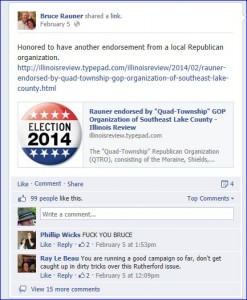 With the Illinois gubernatorial primaries coming up on March 18th, the plot is thickening and the mud is flying—and not only on the campaign trail, but on the social media platforms that all of the candidates have established.
With the Illinois gubernatorial primaries coming up on March 18th, the plot is thickening and the mud is flying—and not only on the campaign trail, but on the social media platforms that all of the candidates have established.
With thousands of fans each, the potential exists for a bottomless pit of comments—supportive, critical, relevant and random, tasteful and obscene. And with a numbers game at play, in which even if only one of 1,000 people goes off in some explosive, even slanderous fashion, it’s not hard to imagine that the potential is regularly being realized.
Democratic Gov. Pat Quinn is a shoo-in for the nomination, so the real drama is on the Republican side, with four candidates vying for a shot at unseating Quinn in November: Illinois Treasurer Dan Rutherford, State Senator Bill Brady, State Senator Kirk Dillard and the “outsider,” venture capitalist Bruce Rauner.
And voters on the GOP side, weary of politicians who have presided over years of corruption and ineptitude, are strongly favoring Rauner, according to the polls.
There are any number of fundamental questions that someone might pose to gauge the preparedness and merit of any given candidate for such an important public office.
Among them:
*What kind of leadership has the candidate demonstrated, in government or other organizations?
*What is the individual’s academic and professional background—has he shown evidence of intelligence and expertise in challenging realms?
*How original, insightful and grounded in reality is the candidate in discussing the most pressing issues facing the state of Illinois?
*How has he behaved in his personal life—are there are any skeletons in the closet and, if so, do any disqualify him from service?
This list only hints at some questions that you may have, as well. Regardless of the precise nature of the questions, though, voters ought to consider raising one as it relates to common public relations sense and social media: How has the candidate and his campaign staff fared in overseeing their Facebook page?
On the surface, it might seem a trivial matter. At minimum, though, it should be seen as a kind of microcosm of communications management: if someone cannot adequately administer a PR task as simple as their own Facebook page, how well can they be expected to run their gubernatorial administration?
Now, let’s be clear and fair: it is unreasonable to expect any candidate and his team to respond to every question or to maintain complete control over the content that flows through their pages. However, if a politician wants to inspire confidence that he can lead 13 million people, one basic pre-requisite ought to be building a team that is quick to scrub its own social media walls of the most extreme instances of filth smeared all over them.
Doing so is not “covering up” or playing the Pollyanna, as if everyone is on your side, but ensuring that appropriate standards of public discourse are being met. Taking out the garbage encourages thoughtful people to chime in and clears the space for real, constructive dialogue. And by all means, that dialogue certainly ought to make room for passionate disagreement.
On that count, Rauner is coming up well short. The Bruce Rauner Facebook page, with more than 15,000 fans, is littered with repeated attacks that include vulgarities, mockery and accusations of criminal and personal misconduct. Here’s one example that is printable:
“Hey, Bruce cut me a check and I’ll spread lies about your opponents for you. I’m for sale, I’m for sale! You should be ashamed! You are a crook just like Blagojevich!”
Another sequence, prompted by a Feb. 5 post announcing an endorsement for Rauner, includes multiple “f-bombs” from critics, followed by an on-the-mark comment from a woman who said the individual making the crude commentary should be banned from the site.
That commenter goes on to state (all capital letters hers): “SOMEONE SHOULD MEET YOU ON THE STREET AND JAM A BAR OF SOAP DOWN YOU (sic) DIRTY THROAT!”
She had a good point, however hyperbolic her proposed soapy solution may have been. Meanwhile, this all raises the question: Why are the administrators of Rauner’s Facebook page allowing all of that coarse vitriol to remain?
The page appears to be more beleaguered than that of his rivals, very likely because as the frontrunner he is such a large target. All the more reason for him to prioritize thoughtful review and, when necessary, deletion of offensive remarks on his website. Failure to do so implicitly condones the outrageous remarks and is a turn-off to more thoughtful would-be commenters who will refrain from posting on the page and may well avoid it altogether..
Some heckling at news conferences and in other face-to-face encounters is part of the price we pay for rightly valuing freedom of speech. But that doesn’t mean a campaign’s Facebook page should abdicate its authority so wholly to trolls and expletive-spewing nincompoops.
A vital first step, for candidate Rauner and anyone else in or out of politics, is the creation of a social media policy that spells out the rules of engagement, as well as the consequences for breaking those rules—up to and including banning individuals from the page.
Related Posts:
Facebook Shift to ‘Boost Post’ Inspires Bevy of Tongue-in-Cheek Ideas
Political Pundit Proft Offers Unique Blago Blast
